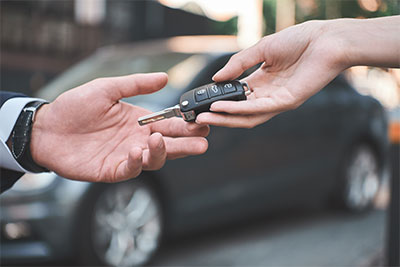So, you’re in the market for a new vehicle – congrats! This can be a huge milestone. The choice between buying and leasing a car is often a tough call. One on hand, buying definitely involves higher monthly costs, but you do actually own your vehicle. Leasing, however, lets you have lower monthly payments, but you get into a cycle in which you truly never stop paying for the car. Both are valid ways to get your hands on a new vehicle, it just depends on your circumstances. So, before choosing an SUV or truck in white or black, let us help you see the pros and cons of leasing vs. buying a car!
Leasing vs. Buying 101
When you’re trying to determine whether or not you should lease or buy your next car, it’s important to take into consideration these three main factors:
- The miles/kilometres you expect to drive
- The amount of $$ you’re willing to spend
- The purpose of the vehicle
Simply put, leasing is when you pay for the right to drive the vehicle for a fixed period (generally three to four years). Buying means you maintain 100% possession of the car. Certified pre-owned vehicles (CPOs) and used cars are also an option, especially if you’re purchasing them with a loan. However, the vehicle is officially yours once the loan is paid off.
Leasing: Pros & Cons
Who is Leasing Best For?
Leasing is the right option for you if you want to get a new vehicle without a substantial financial commitment upfront. It eases your monthly costs and makes them more manageable.
Pros
Leasing comes with some great benefits! For instance:
- You drive the car during its most trouble-free years
- The lease may include free oil changes & other scheduled maintenance
- You don’t have to worry about fluctuations in the car’s trade-in value when it’s time to move onto to your next car
- Your payments will definitely be lower in comparison to buying flat out
- You don’t need to put as much money down
Cons
The grass isn’t always greener though! There are certainly come drawbacks from leasing, like:
- You can encounter mileage restrictions and if you surpass them, you’ll pay a premium
- There are always additional costs for wear and tear that’s considered “excessive” i.e., anything beyond small scratches and dings
- You won’t actually own it at the end unless you choose a lease buyout
- If you’re leasing one car after another, monthly payments will continue on forever instead of paying off a loan
- You may have to pay a fee when you turn your vehicle in at the end of the lease
Buying: Pros & Cons
Who is Buying Best For?
Buying is for those who prefer to be in total control of their vehicle and finances. You don’t have to worry about mileage restrictions or additional charges. Although buying or financing your car can take some extra work, you’ll have full control of the vehicle and can sell it or trade it at any point.
Pros
Buying definitely gives you the advantage of building equity in a valuable asset, along with lots of other benefits like the ones below!
- No mileage limits
- No additional wear and tear charges
- You’ll always have the ability to sell and/or trade at any point because the car is essentially yours
- You can customized the vehicles as you wish, without stipulations
- At the end of the loan term, you have no further payments and have built equity to help pay for your next vehicle, if you wish!
Cons
While owning your own vehicle may seem like a great idea, it does come with some negative aspects that you should consider, like:
- Higher monthly payments
- A higher down payment is required (although, the more you put down up front, the easier it is to reduce how much you need to borrow)
- Long-term maintenance costs can start to add up – when it breaks, you have to fix it!
- You’ll have to deal with selling or trading in your car when you decide you want a different one
- There’s a lot more upfront costs when it comes to buying a car flat out
Final Considerations
Ultimately, it’s somewhat a difficult to make a fair head-to-head comparison on leasing vs. buying a car, since it really relies on a case-by-case basis. It really comes down to your personal finances and driving habits. Either way, when it comes down to making the decision, remember that your credit score serves as the primary measure of your ability to afford monthly payments. Ideally, you’re going to want to aim for a score between 680 and 740 for leasing, and 660 or higher for buying. Whatever you choose to do, always be prepared to walk away and get a better deal for this big purchase.
Got your new car and not sure what basic maintenance you may need to keep up with? Check out these tips & tricks to keep you safe on and off the road.











